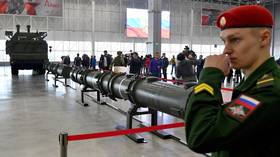NATO dismisses Russia’s call for moratorium on missile deployment
NATO has rejected Russia’s call for a ban on the deployment of nuclear-capable intermediate-range missiles in Europe, while blaming Moscow for violating the INF treaty that was scrapped by the US.
Responding to a Russian suggestion for a moratorium on the deployment of such missiles in Europe on Tuesday, NATO Secretary-General Jens Stoltenberg dubbed the idea “not credible.”
“The proposal from Russia on a moratorium is not credible because we had a ban and they violated that ban,” Stoltenberg said, referring to the Intermediate-Range Nuclear Forces Treaty (INF), a landmark 1987 security agreement that the US unilaterally withdrew from back in 2019.
He repeated the bloc’s accusations that Moscow had run afoul of the now-defunct treaty by deploying missile systems prohibited under its scope, demanding Russia dismantle them before offering to negotiate a moratorium.
So unless Russia in a verifiable way destroys all its SSC-8 missiles, which are those missiles that violated the INF treaty, then it is not credible when they now propose a ban on something they actually have already started to deploy
NATO's secretary general was referring to the 9M729 missile, also known under NATO’s reporting name SSC-8 Screwdriver. The 9M729 is a ground-launched cruise missile, designed to be used with mobile launchers. Washington and NATO have repeatedly claimed the missiles were created in violation of the INF Treaty, which banned land-based ballistic missiles, cruise missiles, and missile launchers with ranges of 500km to 5,500km. The 9M729 missiles were ultimately cited by the Trump administration as the pretext for scrapping the INF agreement.
Moscow, however, has maintained that the munitions have been created in “full compliance” with the treaty, and could fly up to 480km.
Russia has also claimed that the US had been in violation of the now-defunct treaty itself, pointing to the Mk-41 Aegis Ashore systems, which are deployed in Europe.
While Washington portrays the systems only as a part of its anti-missile defense, Russia has repeatedly pointed out that the Mk-41s can be used to launch cruise missiles such as Tomahawks, which are currently carried exclusively by US naval vessels.
In recent weeks, Russia has called for the creation of a comprehensive security agreement, with the proposed restrictions on missile deployment coming as part of it. Moscow also signaled that it has no trust in NATO’s promises on the non-deployment of such missiles, insisting that such assurances must come in a legally binding form. The stance was reiterated by Russia’s Deputy Foreign Minister Sergey Ryabkov, who warned that Moscow might ultimately be forced to deploy such weaponry in Europe itself.














